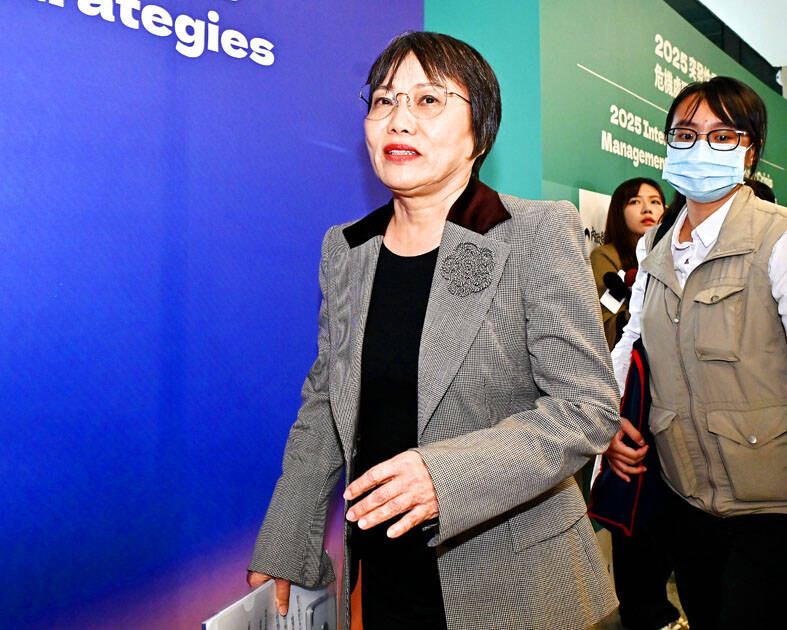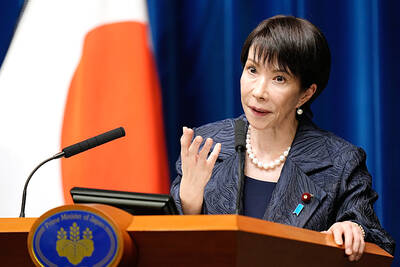The Nationality Act (國籍法) applies to all countries other than Taiwan and any proposal to exempt people from a particular country or region would in effect single them out as a special category, Minister of the Interior Liu Shyh-fang (劉世芳) said yesterday.
The Chinese Nationalist Party (KMT) on Monday accused Liu of “arbitrarily” expanding the definition of “foreign nationals” to include citizens of China.
The Act Governing Relations Between the People of the Taiwan Area and the Mainland Area (臺灣地區與大陸地區人民關係條例) stipulates that Chinese have special legal status as people of the “mainland area,” which Liu completely ignored, the KMT said.

Photo: Tu Chien-jung, Taipei Times
“Liu should resign, as she also disregarded amendments to the Republic of China Constitution — an act of political manipulation that exploits a sensitive issue to provoke China. This would put Taiwan under greater risk,” it said.
On Monday, Liu said that it would be tacit acknowledgement that Taiwan is part of China if Taiwan did not treat the “mainland area” as a separate country.
The cross-strait act guarantees the right of Chinese to live and work in Taiwan, as well as access to welfare, as long as they obtain legal permission to do so, Liu told reporters yesterday ahead of an international forum in Taipei.
“However, the only difference is that Article 20 of the Nationality Act requires elected officials to pledge loyalty to one country and does not allow dual allegiances,” she said.
Proposed amendments to the Nationality Act might result in labeling Chinese as a special category of people — an approach that could create uncertainty about the participation of Chinese spouses in public activities or in the public sector in Taiwan, she said.
Article 20 stipulates that Taiwanese with dual nationality cannot hold elected office in Taiwan, with those who are elected to public office or other public positions are required to renounce their foreign nationality, completing the process within one year of taking office.

The Ministry of Foreign Affairs (MOFA) yesterday voiced dissatisfaction with the Comprehensive and Progressive Agreement for Trans- Pacific Partnership (CPTPP), whose latest meeting, concluded earlier the same day, appeared not to address the country’s application. In a statement, MOFA said the CPTPP commission had "once again failed to fairly process Taiwan’s application," attributing the inaction to the bloc’s "succumbing to political pressure," without elaborating. Taiwan submitted its CPTPP application under the name "Separate Customs Territory of Taiwan, Penghu, Kinmen and Matsu" on Sept. 22, 2021 -- less than a week after China

THE GOOD WORD: More than 100 colleges on both sides of the Pacific will work together to bring students to Taiwan so they can learn Mandarin where it is spoken A total of 102 universities from Taiwan and the US are collaborating in a push to promote Taiwan as the first-choice place to learn Mandarin, with seven Mandarin learning centers stood up in the US to train and support teachers, the Foundation for International Cooperation in Higher Education of Taiwan (FICHET) said. At the annual convention of the American Council on the Teaching of Foreign Languages held over the weekend in New Orleans, Louisiana, a Taiwan Pavilion was jointly run by 17 representative teams from the FICHET, the Overseas Community Affairs Council, the Steering Committee for the Test of Proficiency-Huayu, the

A home-style restaurant opened by a Taiwanese woman in Quezon City in Metro Manila has been featured in the first-ever Michelin Guide honoring exceptional restaurants in the Philippines. The restaurant, Fong Wei Wu (豐味屋), was one of 74 eateries to receive a “Michelin Selected” honor in the guide, while one restaurant received two Michelin stars, eight received one star and 25 were awarded a “Bib Gourmand.” The guide, which was limited to restaurants in Metro Manila and Cebu, was published on Oct. 30. In an interview, Feng Wei Wu’s owner and chef, Linda, said that as a restaurateur in her 60s, receiving an

MORE RETALIATION: China would adopt a long-term pressure strategy to prevent other countries or future prime ministers following in Sanae Takaichi’s steps, an academic said Taiwan should maintain communications with Japan, as Japanese Prime Minister Sanae Takaichi is to lead a revision of security documents, Taiwanese academics said yesterday. Tensions have risen between Japan and China over remarks by Takaichi earlier this month that the use of force against Taiwan would constitute a “survival-threatening situation” for Japan. Prospect Foundation president Lai I-chung (賴怡忠) yesterday said Takaichi’s stance regarding Taiwan is the same as past Japanese prime ministers, but her position is clearer than that of her predecessors Fumio Kishida and Shigeru Ishiba. Although Japan views a “Taiwan contingency” as a “survival-threatening situation,” which would allow its military to